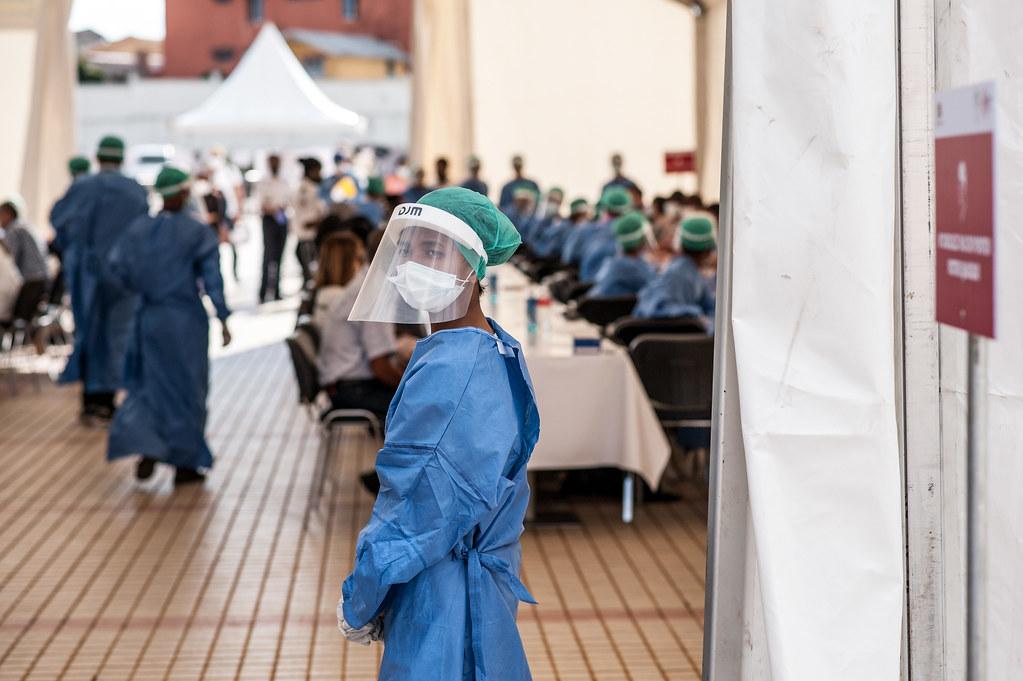Failing to prepare for dignified COVID-19 burials is preparing to fail

African countries can hope for the best-case scenario, but should plan now for the worst.

Healthcare professionals in Madagascar. Credit: World Bank / Henitsoa Rafalia.
Across the world, the coronavirus continues to spread with a death toll that tragically and inevitably climbs alongside it. I have worked in many mass casualty events – from armed attacks and explosions, to industrial accidents, plane crashes and cyclones. What makes COVID-19 different is its scale. The disease is not a localised problem. Every country could succumb to a COVID-19 surge, no matter how slowly the virus spread to begin with, and one cannot ignore resurgences or “second waves”.
As a forensic professional, my fear is that countries will neglect to plan for how they will manage the dead during a surge. This would lead to preventable and unnecessary suffering for the families of the deceased. Planning is critical not just to save lives but ensure the dead are respectfully handled so families can mourn.
I currently live in South Africa, which has the seventh highest caseload globally. The country has experience in mass casualty events and the infrastructure to deal with a high number of COVID-19 deaths. Refrigerated trucks are being used in some places to store bodies, while funeral workers are speaking of their workload doubling in just a month. They have had to balance the pressure of higher fatalities while also ensuring bodies are handled respectfully and safely.
This is what can happen when plans are in place. Now imagine what this could look like if the management of the dead is an afterthought. As a forensic specialist and a disaster response manager, I have witnessed countless incidents of how a failure to plan led to dreadful consequences for both death care workers and families.
I know of responders who died while working in hazardous environments because their safety wasn’t considered the highest priority, or their training didn’t adequately prepare them. I have witnessed explosions after which bodies were recovered and strewn across the back of flatbed truck, only to decompose in the blazing sun in full view of the public. I have seen administrative mistakes and poor coordination between agencies lead to bodies not being identified and only returned to families after three decades.
The bottom line is that mass fatality planning is not just about meeting legal and administrative requirements. It should see the body for what it is: the remains of a person who was cherished and a family who is hurting. Both require our respect and compassion.
Preserving burial traditions
In many places, the death of a loved one or neighbour draws large numbers of people to the funeral to mourn. It is common to touch or kiss the body in various customs. For some traditions, burying a loved one in ancestral land is important, even if it means repatriating the body across borders.
A heart-breaking ripple effect of COVID-19 is that a lot of the ways people grieve have been disrupted. However, with proper planning and safe and reasonable procedures, we can minimise the impact that COVID-19 has on cultural, religious, and traditional practices.
For example, we at the International Committee of the Red Cross created guidelines that fuse safe management of COVID-19 deaths and Islamic burial practices. It clarifies that bodies of people who die from the coronavirus do not need to be cremated, which is prohibited under Islamic tradition. The Salat al-janazah, or funeral prayer, can also still take place with physical distancing and limits to the crowd size.
Infectious bodies have the potential to spread the infection.
Bodies of people affected by #COVID19 could be infectious and need to be managed properly. pic.twitter.com/03lV43Dhfj
— ICRC Africa (@ICRC_Africa) August 26, 2020
The best mass fatality plans are developed as part of a wider disaster management plan that incorporates the experience of first responders, health professionals, community and religious leaders, and forensic specialists. For COVID-19, this means that preventing the spread of the virus, treating the sick, and burying the dead all happen simultaneously – all while protecting the safety of first responders and treating affected communities with care.
If countries fail to prepare and COVID-19 restrictions around burials are unreasonable, we could see families not comply and carry out unsafe funerals. Burial workers could fall sick to COVID-19. Death records could be poorly recorded, making it difficult to track the number of deaths. Bodies could be lost in disorganised systems. Authorities could resort to mass graves, leaving families with the agony of not knowing what happened to their loved ones.
This is all preventable, so long as plans are put in place when COVID-19 cases are manageable. We do not have much time to wait. The virus is spreading or entering second waves and while the best-case scenario is that the kind of surge seen in South Africa does not repeat elsewhere, officials must be prepared for the worst-case scenario. Too much is at stake to ignore the risk.






Yes so the vulnerable, PWD’s, the Elderly are covered and protected by humanitarian law enforcement.